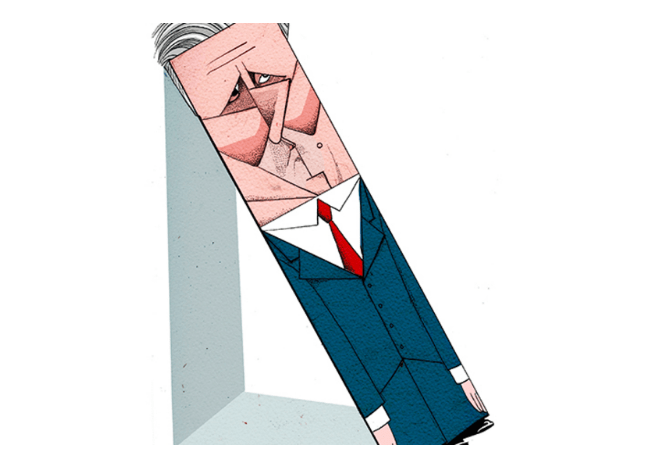After a solid 2020 Keir Starmer is now finding life hard. By the end of last year, it appeared he was dragging his party back from its disastrous 2019 election result. But YouGov now has Labour lagging the Conservatives by 13 points.
The explanation for this might be simple and temporary: the government’s successful vaccination programme. But the positive reception to the recent Budget suggests voters are happy with the Tory approach to tackling the economic mess left by the pandemic. As Britons anticipate a post-Covid future, perhaps this is a significant turning point?
Starmer’s reversal of fortunes has been accompanied by a darkening chorus of hostile commentators. It is no surprise that recovering Corbynite Owen Jones claims that Labour now ‘lacks a political soul’. But when the usually measured New Statesman argues Starmer’s party has ‘lost confidence in what it is, what it wants and for whom it speaks’ maybe we should pay attention?
If this dip has given heart to Corbynite ultras for whom Labour’s 2019 manifesto has the status of Holy Writ, if doubts set in across the party Starmer could be in trouble. One-third of Labour members who voted for him as leader were supporters of Corbyn’s platform: they were happy while Starmer was flying high, but this recent reverse might test their loyalty.
Despite the chatter, Starmer has outlined a clear purpose
Yet, despite the chatter, Starmer has outlined a clear purpose, one consistent with traditional Labour concerns and amongst the most radical in the party’s history. But few seem aware of it.
In his first statement as leader, Starmer claimed Covid meant, ‘we cannot go back to business as usual. This virus has exposed the fragility of our society. It’s lifted a curtain’. He also made the case for ‘good government, a government that saves lives and protects our country’.
During 2020 this argument took a backseat to demonstrations of Starmer’s competence at Prime Minister’s Questions. However, in a major speech delivered in advance of the Budget, Starmer called on Brits to embrace, ‘a future that looks utterly unlike the past’, one devoid of the inequality and insecurity which marked the previous decade and left the country unprepared for Covid and ill-equipped to address its economic legacy. Starmer claimed this historic moment required an active government willing to work with the trade unions and socially responsible businesses to build a more equal and a more dynamic economy.
Together with Shadow Chancellor Anneliese Dodds’ Mais lecture, delivered a few weeks before, his speech set out the key elements of a developing Starmerism. Dodds confirmed Labour would transform the economy to make it more resilient and competitive through transparent and ‘responsible’ long-term decision-making that would guarantee value for money. All this was designed to reassure the City and that majority of voters who have habitually doubted Labour’s ability to manage the economy. But the framework Dodds sketched out also included, ‘a rebalancing of power in the workplace, such that employees have a more concrete set of rights and a greater sense of control’ and reversing the damaging impact of low pay, precarious work and of inequality on the economy.
While seeking the party leadership Starmer positioned himself between Blair and Corbyn but refused to say to whom he was closest. It is now clear Starmer is much closer in policy terms to his immediate predecessor. But Starmer is even closer to the leader who preceded Corbyn: Ed Miliband. Miliband’s attempt to ‘move on from New Labour’ floundered. Yet in 2017 Corbyn adopted a manifesto characterised by Stephen Bush as ‘turbo-charged Milibandism’. If such analogies are helpful it is likely that, regarding domestic social and economic policy at least, Starmerism will prove to be Corbynism – but with the brakes on.
This radical agenda – which places equality at its heart – is however being advanced at the same time as Starmer is trying to reclaim patriotism from the Conservatives and distance the party from the anti-Western internationalism with which Corbyn often flirted. Thus Labour has expressed its ‘non-negotiable’ support for Britain’s nuclear deterrent and for Nato, while it has backed the so-called ‘spycops’ bill, which allows undercover agents to commit crimes while infiltrating criminal gangs.
And, hoping to put the issue behind him, Starmer insisted his MPs voted for the Johnson Brexit deal. Needing to win back culturally conservative Red Wall voters while maintaining and building on its support amongst culturally liberal metropolitan voters, this is exactly the mix of approach Labour needs if it has any hope of winning the next election.
But Starmer’s problem is less with his purpose and more with how it is being communicated. Too many voters – not famous for reading speeches – are unsure what his party now stands for. The Labour leader’s reluctance to talk about himself and his working-class background is also a serious impediment.
How the son of a nurse and tool maker rose to become Director of Public Prosecutions could be used to illustrate any number of Labour themes. Instead, there is virtual silence, leading some to see ‘Sir Keir’ as a patrician figure.
If the media is not as hostile as it was when Corbyn was leader, it is unlikely to do him many favours here. So Starmer needs to develop for himself the kind of public personality and to coin some of the evocative phrases associated with his favourite Labour leader, Harold Wilson when he was Leader of the Opposition. Wilson’s agenda to modernise Britain was as complex as is Starmer’s; but he managed to sum it all up in two words: ‘white heat’.






Comments